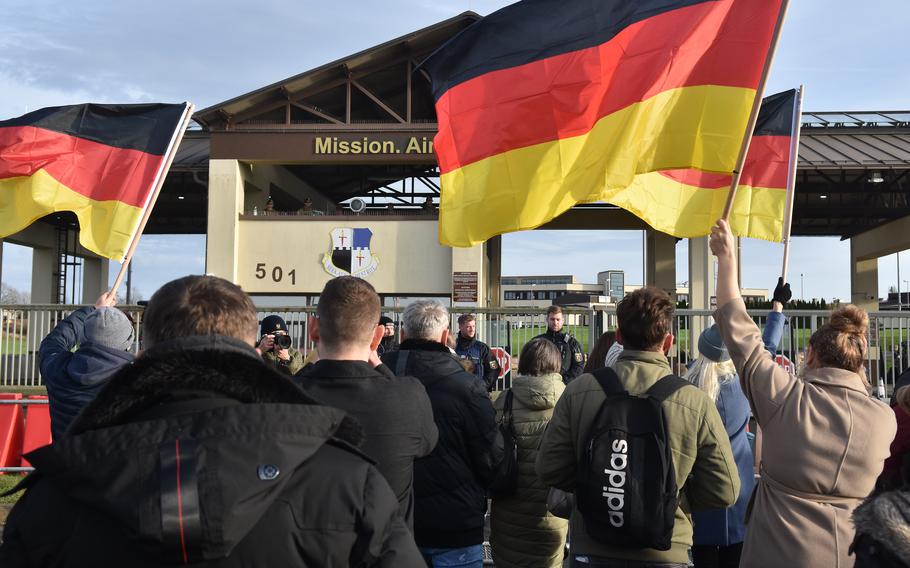Air Force
Protesters gather again outside US air base as German state reviews probe of killing
Stars and Stripes November 25, 2024

Protesters wave German flags and shout outside the main gate of Spangdahlem Air Base, Germany, on Nov. 24, 2024. The demonstration was the second one held since a Spangdahlem airman accused of killing German national Michael Ovsjannikov was acquitted last month. (Jennifer H. Svan/Stars and Stripes)
SPANGDAHLEM AIR BASE, Germany — Hundreds protested for a second time outside this base in rural Germany following last month’s murder acquittal of an American airman, a decision that has prompted a German state’s legal review of its actions in handing the case to the U.S. military.
On Sunday afternoon, an estimated 200 people marched to the main gate chanting “Don’t protect the killer. You protect the killer. Shame on you. Shame on America.”
Turnout was smaller than it was a week after Airman 1st Class Grant Harrison was found not guilty Oct. 11 of killing German martial arts athlete Michael Ovsjannikov last year.
Ovsjannikov was stabbed to death near his home in Wittlich on Aug. 19, 2023, in the early morning hours as Pig Fest, an annual street fair, was winding down.
A jury found Harrison not guilty of unpremeditated murder after witnesses gave conflicting testimony about a confrontation with Ovsjannikov involving Harrison and another airman, Staff Sgt. Robert Cain II.
“I used to be close friends with Americans for many years,” said protester Nadja Mantaj, of Wittlich. “Now I’m not sure anymore if I want them to stay here.”
Mantaj, 29, grew up with Ovsjannikov, who was 28 when he died. She said the marchers want a statement from the Americans at the very least and possibly an apology.
The 52nd Fighter Wing at Spangdahlem hasn’t commented publicly on the verdict but released a statement last week about the protest.
“As guests in our host country and neighbors to those in the surrounding community, Spangdahlem Air Base recognizes and respects the rights of individuals to peacefully, safely and lawfully assemble and express their opinions,” the statement said.
The German government also hasn’t offered an opinion on the ruling but the case has prompted a legal review, the Rheinland-Pfalz state justice ministry said last week.
The process German authorities followed in handing over jurisdiction in the case to the U.S. military is under scrutiny, ministry spokesman Philipp Sturhan said, adding that state justice minister Herbert Mertin will present findings to a committee on Dec. 12.
Germany has primary jurisdiction in cases involving a U.S. service member and a German citizen, according to a supplementary provision to the 1951 NATO Status of Forces Agreement.
Germany has up to 21 days to withdraw the waiver, however, “if essential interests of the German administration of justice” are at stake, such as a crime by a U.S. service member against a German government institution, said Mohamad El-Ghazi, a criminal law professor at the University of Trier.
“The German judiciary has so far had great confidence in the U.S. judiciary,” he said. “Often, higher penalties were imposed than German criminal law would have allowed.”
Harrison faced a maximum punishment of life in prison if convicted of unpremeditated murder. He was also found not guilty of aggravated assault with a dangerous weapon and obstructing justice.
A transient aircraft journeyman with the 726th Air Mobility Squadron, Harrison was 26 when the trial concluded.
The local outrage that followed the verdict has fixated on a purported confession by Harrison during his initial interrogation with German and U.S. military law enforcement.
In March, the defense filed a motion to suppress his statement, said Grover Baxley, who represented Harrison. After a three-day hearing in April, the military judge in June ruled the statement inadmissible, Baxley said.
No evidence was presented that Harrison had been informed that “he was suspected of murder, manslaughter or any other offense involving death,” Baxley said.
“A suspect cannot freely, knowingly, and intelligently waive their right to remain silent if they are not made aware of the crime of which they are suspected,” Baxley said.
Trier chief prosecutor Peter Fritzen disputed Baxley’s assertion, stating that Harrison was expressly informed during the initial interrogation by German criminal police officers that they were “investigating a homicide and that he was suspected of having something to do with the homicide.”
The 52nd Fighter Wing said Oct. 30 that the military judge determined Harrison’s statement was not given voluntarily.
The documented ruling is not publicly available and must be requested under the Freedom of Information Act, the wing statement said. The FOIA release process is often lengthy and documents may include substantial redactions.
During Harrison’s court-martial, Cain testified that Ovsjannikov punched him in the temple, dazing him. The next thing he remembered was waking up on his back with Ovsjannikov on top of him and Harrison standing close by with a knife, he said.
The only DNA evidence linking Harrison to the killing was specks of his and the victim’s blood on one of his shoes.
A witness who had been drinking that night and testified at the court-martial to seeing the fight said it was Cain and not Harrison who killed Ovsjannikov. No other witness blamed Cain for the killing.
At Sunday’s protest, a loudspeaker played a recording purporting to be Harrison’s written confession. Protest leader Aljona Mantaj said she received it from Ovsjannikov’s parents, who were at the court hearing and also at the protest Sunday.
Aljona Mantaj said demonstrators want changes so Germany maintains jurisdiction in criminal cases involving U.S. military personnel.
“If an American boy kills a German, then you can’t give the case to Americans,” she said. “It should be a German judge, not an American.”